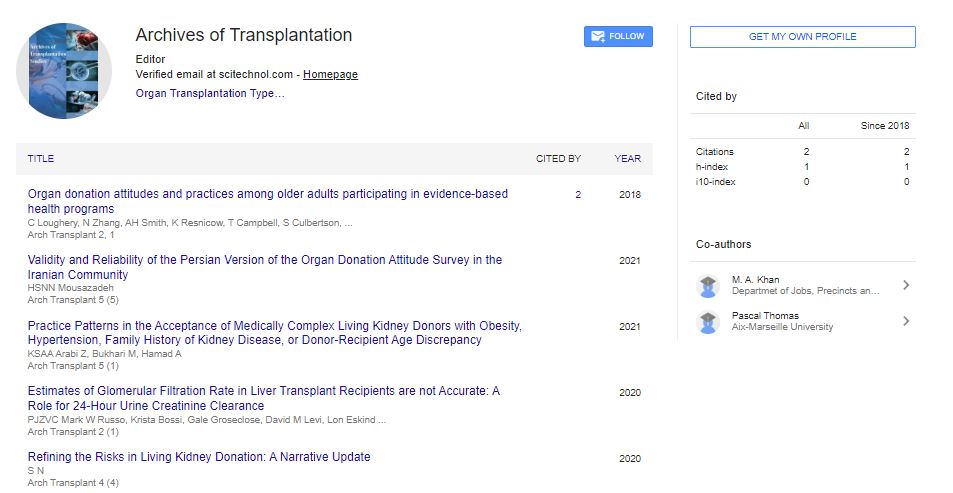Commentary, Arch Transplant Vol: 7 Issue: 4
Exploring Transplant Laws and their Impact on Healthcare Systems
Takema Oguwa*
1Department of Infectious Diseases, The University of Tokyo Hospital, Tokyo, Japan
*Corresponding Author: Takema Oguwa,
Department of Infectious Diseases,
The University of Tokyo Hospital, Tokyo, Japan
E-mail: takema_oguwa@uth11.jp
Received date: 22 November, 2023, Manuscript No. AT-24-124983;
Editor assigned date: 24 November, 2023, PreQC No AT-24-124983 (PQ);
Reviewed date: 11 December, 2023, QC No. AT-24-124983;
Revised date: 19 December, 2023, Manuscript No. AT-24-124983 (R);
Published date: 26 December, 2023, DOI: 10.4172/AT.1000158
Citation: Oguwa T (2023) Exploring Transplant Laws and their Impact on Healthcare Systems. Arch Transplant 7:4.
Description
Organ transplantation has emerged as a life-saving medical procedure, providing hope to individuals suffering from organ failure. However, the success and ethical practice of transplantation heavily rely on a robust legal framework. It delves into the complex world of transplant laws and their profound impact on healthcare systems globally. Over the years, transplant laws have evolved to address the complex challenges surrounding organ procurement, allocation, and transplantation. Initially, the focus was on establishing the legal basis for the ethical and safe conduct of transplant procedures. Today, these laws extend to issues such as organ trafficking, informed consent, and equitable access to transplantation.
One primary objective of transplant laws is to uphold the ethical principles that govern organ donation and transplantation. Regulations are in place to prevent exploitation of donors, ensure voluntary and informed consent, and prohibit the buying and selling of organs. These legal safeguards not only protect the rights of donors but also maintain the integrity of the entire transplantation process. Transplant laws play a pivotal role in establishing fair and transparent systems for organ procurement and allocation. Regulations dictate how organs are collected, transported, and assigned to recipients. The goal is to develop a system that prioritizes medical need, compatibility, and urgency while preventing any form of discrimination or bias.
The landscape of transplant laws varies across countries, reflecting diverse cultural, ethical, and societal norms. Some nations opt for an opt-in system where individuals must explicitly express their willingness to donate organs, while others follow an opt-out approach, presuming consent unless otherwise stated. These legal nuances significantly influence organ donation rates and the overall success of transplantation programs. Organ procurement methods have undergone significant advancements, guided and regulated by transplant laws. Traditional methods, such as Donation after Brain Death (DBD), are complemented by the utilization of organs from Donation after Circulatory Death (DCD) and living donors. Legal frameworks dictate the ethical guidelines surrounding these methods, ensuring that the procurement process adheres to the highest standards of patient safety and consent.
Fair and transparent organ allocation systems are essential for the success of transplantation and the preservation of public trust. Transplant laws often prescribe the methods by which organs are allocated, considering factors like medical urgency, compatibility, and geographic proximity. The adoption of organ sharing networks and prioritizing patients based on medical need are essential elements guided by legal regulations. The global landscape of transplant laws reflects a tapestry of approaches influenced by cultural, ethical, and legal considerations. Countries may adopt either an opt-in or opt-out system for organ donation, leading to diverse donor rates. International collaboration and standardization efforts are ongoing, aiming to bridge gaps and harmonize legal frameworks to ensure consistent and ethical practices in organ transplantation globally.
Despite the progress made in transplant legislation, challenges persist. Issues such as organ shortage, black-market organ trade, and disparities in access to transplantation continue to pose significant hurdles. Policymakers are tasked with continuously refining laws to address emerging challenges and ensure that healthcare systems can adapt to evolving medical and ethical landscapes. The impact of transplant laws on healthcare systems is multifaceted. By establishing a legal framework, governments and healthcare organizations develop an environment that encourages organ donation, protects the rights of donors and recipients, and fosters public trust in the transplantation process.
Furthermore, robust laws contribute to the overall efficiency and sustainability of healthcare systems by reducing illegal organ trade, improving patient outcomes, and promoting advancements in medical studies. Transplant laws play a key role in promoting social justice within healthcare systems. They are designed to ensure that access to transplantation is based on medical need rather than financial means. By addressing disparities in organ distribution, these laws contribute to developing a more equitable healthcare system, where every individual, regardless of socioeconomic status, has a fair chance at receiving a life-saving transplant.
Conclusion
In conclusion, transplant laws are fundamental to the ethical and successful practice of organ transplantation. Their impact extends beyond the operating room, shaping the way healthcare systems function and ensuring that the principles of fairness, transparency, and social justice are upheld. As medical technologies advance and societal values evolve, transplant laws will continue to be refined, reflecting the dynamic nature of this life-saving medical procedure and its vital role in the broader healthcare landscape.
 Spanish
Spanish  Chinese
Chinese  Russian
Russian  German
German  French
French  Japanese
Japanese  Portuguese
Portuguese  Hindi
Hindi 